RIPOSTE
by RIP RENSE
|

|
Chocolate,
Beethoven,
and The Beatles
"Suddenly a rainbow rose
and
spread across the land
Hung there while the Beatles sang
I want to hold your hand
What can you say?
Here tomorrow, gone today
Faith fades away
For idols with their feet of clay.
. ."
---Robert Hunter, “Aim at the Heart.”
At last, I can look at
the dreary, stark, black-framed "Let it
Be" album cover without feeling crummy, without feeling like “this is the
one that got away,” without being put off by the fact that this is the
only Beatles album cover that shows the four guys divided, separated.
I don’t feel
good about it, mind you, but better.
Thanks to Peter Jackson.
As is now well established, an enormous missing chunk of
Beatles history has been salvaged, contextualized, shined up---indeed,
revealed---repairing a project badly misunderstood for fifty years, and
patching a lot of long-broken hearts in the process. Melodramatic?
No, probably understated.
To grasp the importance of Jackson’s “The Beatles: Get
Back,” and why this extraordinary documentary is nearly eight hours long
(reportedly reduced from 18), one probably needs to have a little historical
perspective. To whit: The Beatles were a tectonic event in world history, nothing less. Right, not just
music history---world history. Without trying to do anything
other than sing and play instruments, without trying to do anything more
than make it big in Liverpool, or maybe even England, without trying to
do anything other than write some catchy tunes.
Or put it this way. Here you had the blundering,
murderous human race lurching along for a few thousand years, from
mayhem to war to genocide to plague to savior to mad dictator to A-bomb
to terrorism to eco-cide to double-cheeseburgers, and suddenly, along came
something. . .different. Really different. Something. . .uplifting.
Shockingly uplifting. You know, like chocolate. Or Beethoven. Not for nothing did
the pithy Grateful Dead songwriter Robert Hunter once write, “Suddenly a rainbow rose
and spread across the land / hung there while the Beatles sang ‘I Want
to Hold Your Hand.’”
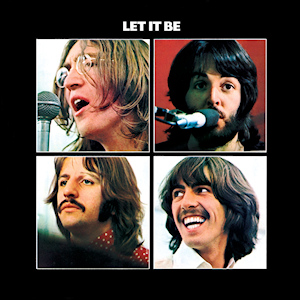 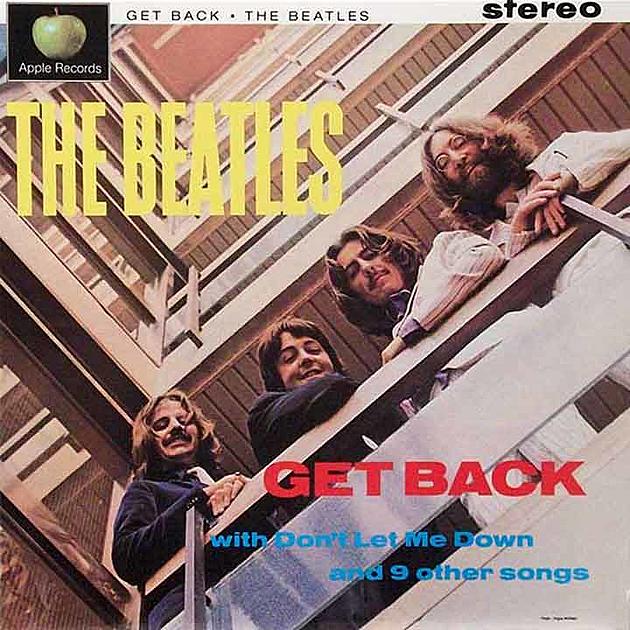
The final, bleak, black-framed "Let it Be" album cover---and
the album cover as originally intended when the project was
called "Get Back." |
They
weren’t just balm after the Kennedy assassination, though there was
that. They weren’t just a pop phenomenon, like Sinatra or Elvis, though
they were that. They were, oh, I don't know, the best possibilities of
human nature, maybe, appearing in a musical form. Wizards of
wonderment, magicians of muse, prophets of the possible. Carl Wilson
in the San Francisco Chronicle used the word, "epochal” to describe The
Beatles, and that is on target. Writer Rob Sheffield---born in 1966, the year
“Revolver” was released---tried to explain it in his Rolling Stone
piece about "Get Back:"
“That’s the mystery at the heart of Get Back: How is it
that we keep hearing ourselves in this music? People all over the world,
from all different generations and cultures, even though most of us
weren’t born back then? Why does the world keep dreaming the Beatles?
"They’re only the icons they are because the music was so majestically
good,” (Peter) Jackson told me. “There’s a joy in the songs that they
sang. In decades and decades to come, it will never be dulled. It will
never be suppressed. That joy, that infectious joy, is part of the human
psyche now.” And that joy is all over Get Back.”
Jackson
pegs it. The Beatles were an Ode to Joy, maybe the
greatest since Beethoven's 9th (and, as a lifelong informal
student of Beethoven, I do not say this lightly.) Tectonic? They were a
mirthquake.
But you have to
accept, I think, that joy is not merely
good feeling, exaltation, even plain old fun. Those lovely items are
short-lived. Imagine something that, every time you see it, think about,
hear it, read about it, experience it in any way at all, gives you a
kind of unfettered happiness, optimism, inspiration, reassurance, lift.
Automatically, instantly, Pavlovian-ly. The Beatles did this. They
didn’t mean to, they just did. They were absolutely electric. I mean,
ditch the Prozac---these guys were singing seratonin. I sometimes wonder if the happiness they engendered
amounted to measurable benefit to humanity and ecosystem---no, really. Happy people
are constructive people, after all. Fact: crime across
the country went way down when the fellows debuted on The Ed Sullivan
Show Feb. 9, 1964. (Note: 72 million watched that night; by
contrast---even with social media---the Grammies fetch about eight
million.)
As if that weren't
enough, John, Paul, George, and Ringo also conveyed, overtly and
implicitly, if I may put it crudely, “To hell with all bullshit, create beauty
instead"---by doing it, themselves. They lived this attitude,
exuded it, sang it; they
were (and are) monuments to free-spirited elan---inspiring by example, even if
unintended. After all, they'd made it to the "toppermost of the
poppermost," as they used to say, simply by being true to their art, and one
another. No, they didn't "break all the rules," as the cliche
goes---they simply ignored them, winked at them ("rattle your jewelry,"
Lennon smilingly told the Royal Variety audience Nov. 4, 1963), and went
their own all you need is love way.
Which brings up this celebrated, much-written-about aspect: so many of their songs were either subtly or anthemically about.
. .love. The only word is love. . .All you need is
love. . . Make love singing songs. . .The love that's shining all around
you. . .Love was such an easy game to play. . .The love you take is equal to the love you make.
. .She loves you yeah yeah yeah. . .Love and beauty---well now, that's
rather serious joy, ever in short
supply, and these are things that The Beatles manufactured in seemingly limitless
abundance, in effervescent song after album after song after movie. Small wonder people went nuts over them. Small
wonder the press glibly diagnosed "Beatlemania." Small
wonder Harrison declared, in retrospect, "They used us as an
excuse to go mad, the world did, and then blamed it on us."
It was a fine madness,
though. And yes, The Beatles get the blame. As
Jackson's documentary reminds in restored footage that is gloriously, almost
painfully alive, that madness is still a fine thing. Get Back?
The Beatles, because of this astonishing documentary, are back,
probably more popular than ever. These boys will forever live---more
alive than most living people---on these eight hours of film shot by
Michael Lindsay-Hogg in 1969, edited by Jackson in 2020-21. There will
be---already has been---no end to the study and rumination over this
unexpected material.
Oh, the break-up? The thing that grabbed your spiritual
ectoplasm and shoved it into a shredder? It will be eternally tragic,
traumatic, to those who lived through it, and yet---and this approaches
miraculous---it is now somewhat less so because of Jackson.
Specifically, because of what we learn while feasting upon those eight
hours from January, 1969. . .
In a way, “The Beatles: Get Back” is like meeting the group for the
first time, so revelatory it is of their personalities, quirks,
vulnerabilities, relationships, mercurial method of working. It is
easily the most important, candid document of the group extant,
certainly the only one to show them in the act of creation (unless you
count the short studio “Hey Jude” footage of 1968.) Did they pose? Mug?
Censor their behavior? Play to the cameras? Surprisingly little. These
guys were so used to relentless cameras in their lives, I don’t think
they adjusted their essential behavior for the lens. And, as has now
been unanimously agreed to in an avalanche of articles, these
legendarily acrimonious sessions were not, repeat not, so acrimonious.
These four young
friends of
intelligence, wit, aplomb, introspection, originality,
music---and, by '69, mythic life experience ---were not, as had been
universally thought, bickering themselves into breaking up, devolving
into the worst, pettiest, sordid ego-driven ugliness. No. They were, it
turns out, trying heroically to keep Beatles machinery
functioning---despite newfound personal priorities, and
too-much-on-the-plate pressures such as marriage, fame, and running their own
Utopian arts company, Apple Corps., with zero business experience or
acumen.
Yes, here they were---the
most loved and emotionally depended-upon humans alive, keenly aware of
that impossible, unwanted responsibility, yet trying to
preserve their storied collaboration. Never mind no Brian Epstein, who
elicited a unanimous group respect that was part of Beatles glue.
Never mind Lennon’s waning, always mercurial Beatles energies siphoned
off by Yoko Ono’s avant-garde posing, Svengali influence, and fondness
for snorting heroin. Never mind brilliant Harrison’s well-earned
resentment over playing second fiddle (well, guitar.) Never mind the group
having offended and alienated producer George Martin to the extent that
he appointed a surrogate, Glyn Johns, to take over. Never mind all these
obstacles, and more, because, as Jackson adroitly, journalistically
shows us, in the end, these wonderful beings called Beatles were as
triumphant and magnificent as aging Muhammad Ali rising to the occasion
of decking the behemoth, George Foreman.
Beatles songs are forever
tritely quoted to illustrate life, and that's a reflection of how
applicable they are to human experience, so here's one more: With “The
Beatles: Get Back,” Jackson has taken a sad song and made it better.
In short, this
is not your average cool awesome “rock doc” about your fave
band, kiddies, with lots of talking heads interrupting old footage with
platitudes and superlatives. Really, those sorts of documentaries are
not documentaries at all. They’re hagiographic public relations reels
for fans, edited for marketing/ demographics-calculated profit. “The Beatles: Get
Back” must be the most intimate look at any band (possibly any composer) in the act of inventing
music, ever. Jackson has, with skill and panache, limned and couched 60
hours of footage into a boffo eight-hour adventure, really a hero’s
journey. The best in us overcomes the worst in us, more or less. We
can work it out. Joseph Campbell, the late professor of comparative
mythology and author of "The Hero With a Thousand Faces," would approve.
No, Harrison was not
merely dour and disinterested, as previously believed. Ringo was not
merely depressed or sullen, as previously believed. McCartney was not
merely intractably overbearing, as previously believed. Lennon was not
merely sarcastic, ambivalent, dismissive, as previously believed. They
were, despite manifesting all of these qualities at times, striving to
work together, to create together, to be together. They had a little
help from their friend, the ebullient Billy Preston, who sealed the
deal, but it was the fraternal forgiveness and love among these four that
saved the day. This is profoundly moving.
Jackson worked with the
legendary “Get Back/Let it Be” session footage (missing for many
years---finally
recovered
by Interpol!) shot by Michael Lindsay-Hogg, often having to
painstakingly synch it up with audio tracks, and then assess it, in toto, like a reporter, not just a filmmaker. He
went in with an open mind to see what he could see, to see what
narrative the film organically held---not the story he could wring from it. Never
mind the angle pervading the it-is-to-weep original 1970 Lindsay-Hogg “Let it
Be” film (whether intended, as Lindsay-Hogg denies, or not): that The
Beatles were falling apart. Lo and behold, Jackson found a different
arc, and a more accurate one---that of the band doggedly surmounting
obstacles to stay together---in the process, creating a film even more honest than “Let
it Be” (which, unlike “Get Back,” did not show Harrison quitting the
band.) The first installment of “Get Back” alone is even more
distressing than the entire “Let it Be" film. By part three, you are just
thrilling to the increasingly charged concert on the Apple rooftop.
Fists clenched, heart racing, you are thinking, they did it!
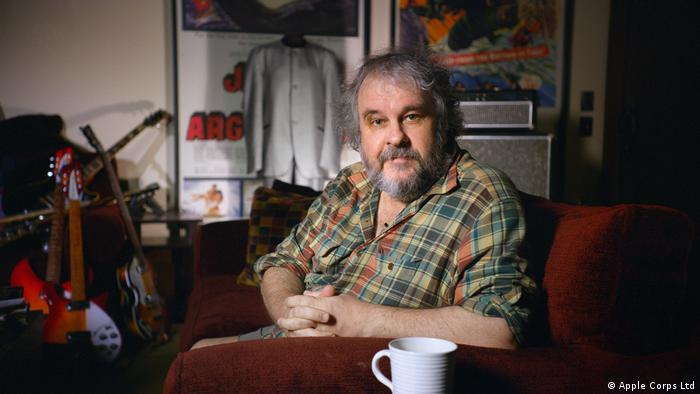
The great Peter Jackson. |
Many excellent
pieces
in the documentary’s wake have summarized the dozens of piquant moments
in the thing, from the secretly taped Lennon/McCartney heart-to-heart. .
.to Preston’s surprise catalyzing arrival. . .to the astonishing
birth of the song, “Get Back,” from McCartney’s lost-in-a-trance bass
jam. . .to Harrison’s dismissing a proposed live performance on an ocean
liner as “insane”. . .to Ringo dabbling in his own song ideas about
either North or South Carolina (he didn’t specify) and octopi. While
they are all utterly remarkable, nothing was more gripping than that
dynamic-defining conversation between John and Paul, caught, like
something out of a “Pink Panther” movie, by Michael "J. Edgar"
Lindsay-Hogg's secret microphone in a lunchroom bouquet.
All the things that were
long suspected and conjectured by countless writers over the years were,
thanks to the bugged bouquet, kind of swept aside. It is astonishing how
self-aware Lennon and McCartney were. Those of us who, way-back-when,
fantasized about sitting down with the fracturing band, and saying,
“Now, if you can just understand thus-and-such, you’ll see that . . .”
can relax. They knew. Lennon knew he was struggling with wanting
to pursue other (Yoko) interests. Paul is aware that his often
overbearing music-direction---long accepted by the group---had worn out
its welcome, as "the lads" had grown older, more confident, capable.
Yes, he still stings from his musical ideas being taken as insults, yet
he humbly acknowledges Lennon's criticism that some McCartney musical
direction damaged or ruined his songs. ("Across the Universe," which was
very precious to Lennon, is an obvious example, as the two girls
recruited by Paul to sing high harmony vocals on the initial version
were at odds with the gravitas of the piece, in Lennon's mind.) And
then, in an exchange so casually candid as to introduce jaws to floors,
the two former boyhood friends and peerlessly intuitive collaborators established,
or re-established, group hierarchy:
“I’ll tell you what,” says McCartney. “What I think. . .the
main thing is this: you have always been boss. Now, I’ve been sort of
secondary boss.”
What’s more, you can feel Lennon’s alarm, and outright guilt,
over the two of them having kept Harrison's songwriting at token level: “It’s like George said, he didn’t get enough
satisfaction anymore because of the compromise he had to make to be
together. It’s a festering wound.”
Yet evidence of
compromise is everywhere: Harrison famously quits (his departure, as is
seldom reported, occurred during a brief period where his wife,
Pattie, had left
him over an alleged affair---which might well have fed his impulsive
Beatles resignation), yet
is cajoled and persuaded into returning by the other three in two
separate meetings over the course of a week---in exchange for dropping
the ideas of performing in an amphitheater in Sabratha, Libya, and
turning the film into a television special. (Never mind John’s
characteristically impulsive quip about hiring Eric Clapton.) And George then
becomes heroic---enthusiastically contributing to the proceedings, despite still having
only a couple of songs accepted. His guitar playing is inspired. The
layout of the Paul song, “Get Back”---gasp---was entirely
George’s idea! (As well as part of “Let it Be.”) Distracted Lennon
manages to occasionally stop the manic Marx Brothers-meets-Dali stream
of consciousness quip-fest enough to do some real old-fashioned
John-and-Paul work. And hell, it is John who
solves the problem of how to arrange another Paul song: “Two of
Us,” suggesting a change to acoustic guitars (with Harrison deftly solving the
briefly discussed problem of no bass, by simply playing that
unforgettable, essential loping bassline on his guitar.) As for McCartney, he
unselfishly tamps down his domineering musical ways, and allows songs to
take shape as a group effort (a much more productive route, as it turns
out) even if it results in him becoming visibly bemused. Ringo? He rolls
his eyes at being told what to do at one point, but at another, he
gladly accepts Paul’s idea of the wonderful verse cymbal-tapping for
“Don’t Let Me Down.”
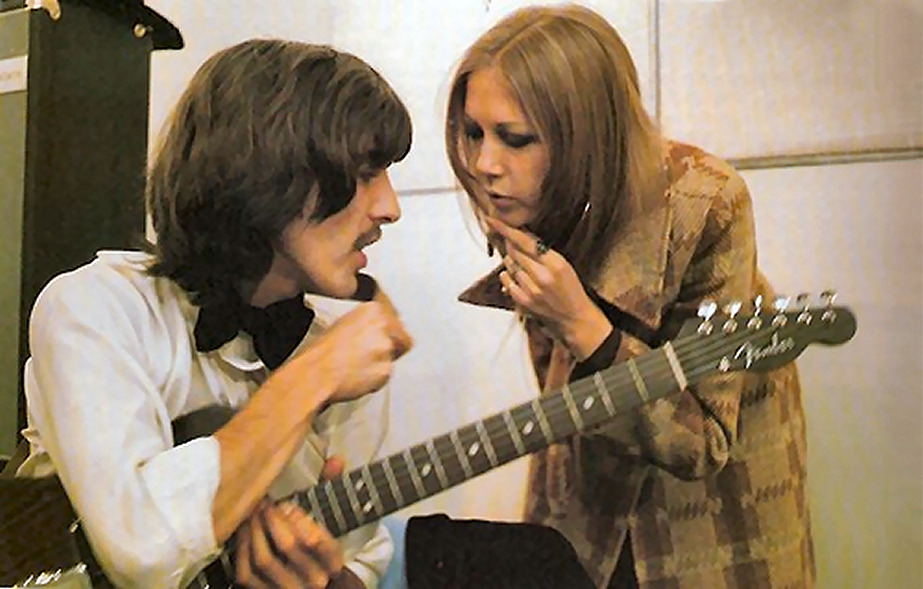
Harrison and wife, Pattie, after he rejoined the group.
His departure, as is not widely reported, came during a
brief marital separation. |
And what
about that “birth of ‘Get Back’" moment? McCartney is
strumming the bass, like a guitar, looking mesmerized, when the
central riff of the song appears from nowhere. He keeps working it. Ringo, watching and listening carefully, nods. Harrison takes note, pays
attention. They all realize that there is a big fish on the line, and
get to work on reeling it in. In the end, this song---long thought to be
a McCartney work---is revealed as a total group collaboration, from Ringo's snare triplets to Lennon's ingenious lead guitar to
Harrison's chop-chop rhythm comping. As Paul remembered in an old Beatles sheet
music book, "We were sitting in the studio and we made it up out of thin
air. . .we started to write words there and then. . .when we finished
it, we recorded it at Apple Studios and made it into a song to
roller-coast by.”
Then there is Preston, appearing
like something scripted. When the band regrouped in the new,
not-quite-ready Apple basement studio, abandoning the impersonal,
massive soundstage at Twickenham, everything improved by leaps and
bounds. But when old friend Preston (whom they met in the early days on
stage in Hamburg, Germany) just happens by (captured on film), it is
galvanizing. Billy sits down and begins playing as if he
already knew all the songs, and had always been in the band. It's
gasp-worthy. The others are clearly over the moon. It's like Mr. Hyde
transformed back into Dr. Beatles.
Oh, where have you been, Billy boy, Billy boy. . .No surprise at
all that Lennon actually suggested making him a Beatle.
Easily the most moving
moment of the entire documentary, for my money, is the day that neither
Harrison nor Lennon showed up for work,
Jan. 13. Paul, his wife, Linda, Ringo, director Lindsay-Hogg, de facto
producer Johns, redoubtable Beatles right-hand-man Mal Evans and a couple
of aides sit glumly in Twickenham,
discussing the
previous day's meeting at Ringo's home, which failed to bring
Harrison back into the fold (and which found Yoko Ono more or less
usurping Lennon's position, speaking almost entirely for him.) Time
passes with no Lennon, until all begin to genuinely fear that this is
it---the man behind the curtain has shown himself; the group has really fallen apart. Silence kicks in. You have to look
closely, but McCartney is clearly seen stifling a huge, heaving, sobbing
breakdown. It's shocking to witness.
This is how much Paul loved John
Lennon, and this is how much he loved The Beatles. It is Jackson's eye
that allowed the world to see it.
|
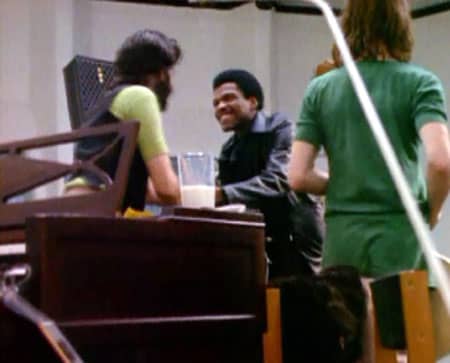 Billy arrives!
Billy arrives! |
How volatile the
situation was with these four extreme personalities, three of which had been
together since they were in mid-teens, and yet how stunning it was
to see them jettison differences, and shift into infectious high
spirits whenever the music started to click. To be able to witness all
of this, after having only had a sliver of information available in the
original "Let it Be" movie, or bootleg albums, is an emotionally
demanding exercise in fascination, frustration, elation---ultimately
leaving you feeling like Billy P. just happened to drop by your house, and
began playing for you.
The lurking
specter (aside from Phil Spector, who didn't show up for almost a
year to create the wildly uneven "Let it Be" album from the sessions) is, yes, the knowledge that eventually the group did split
up---but not until March, 1970, and after the
mountain-climb of “Abbey Road” (originally to have been called
“Everest,” after engineer Geoff Emerick’s cigarettes, possibly also for
the feat accomplished.) Knowing---seeing---that they tried hard to keep Beatling
during "Get Back"---takes some of the sting out of the “Of all sad words of
tongue and pen, the saddest are these: it might have been” factor.
And so this
Byzantine saga turns out, to everyone’s surprise---including Ringo and Paul,
who have praised the documentary to the hilt---to be a success story.
After the disastrous week of trying to invent songs in the chilly,
gigantic Twickenham soundstage---about as hospitable a working
environment as an Amazon shipping center---in the early morning, no
less---after George quits the group. . .after Lennon does not show up
for work, leaving McCartney quelling those full-blown
sobs. . .the band gets back to where it once belonged.
It's a victory of spirit, a victory of belief
in human
cooperation, an affirmation of faith and friendship, and the notion that
the sum is greater than the parts. (Quite a lesson for the present
socially separatist day.)
McCartney's cheerleading speech about his mates being at their best when
their backs are against the wall is borne out, in living color. That's
the point, really: all these events can now be seen, after half a
century of rumor, supposition, assumption, and an overriding
belief that the sessions were a grim failure. Jackson understood
this, saw the epic tale taking place, and, with empathy, an eye
for subtlety, and deep Beatles knowledge, produced a riveting
music-drama of anguish, suspense, surprise. You can’t take your eyes off it, all eight hours. (Thank goodness the job didn’t
go to Ron Howard, whose “The Beatles Live” could not have been more
predictable, shallow, and neglectful in portraying the evolution of the
group into a great live act.)
One more point that comes across like a banner headline: the project,
which was McCartney’s idea, bordered on insane in the
first place. Write, record, and perform a slew of entirely new songs in
three weeks? What other group might have even tried such a thing? And
this came only two months after the release of the band's highly
contentious, occasionally brilliant "white album,” in November,
1968---as well as Lennon's daffy, or at least self-indulgent "Two
Virgins" disc with Ono, with the infamous nudie cover banned around the
world.
There had been a Christmas break, but then taskmaster McCartney was
right back on the phone to his compadres, as always, selling them on
this new venture, an obvious attempt to reunite, reboot. One assumes he
thought the pressure might be inspiring, and in a way, despite the
initial crash-and-burn at Twickenham, he turned out to be right. The proof? Lennon
declaring, “Fuck it. Let’s do it,” as they stood hesitantly at the door
to the Apple rooftop, still unsure about whether to go through with the
now legendary live performance.
And there they
stood on that gray 45-degree day, on a makeshift wooden stage above
London, rediscovering their prowess, power, art. When the bobbies
arrived to politely announce that the band would be arrested for "disturbing
the peace," I laughed. No phenomenon has
brought more peace (joy, happiness, cooperation, love) to the world than
The Beatles. "Disturbing the peace?" With "Get Back," they were creating it.
PRINTER-FRIENDLY VERSION
MORE "GET BACK" RENSE COVERAGE:
DISNEY
MICKEY MOUSES
"THE BEATLES GET BACK" DVD/BLU-RAY
REVIEW:
LET IT BE---
Six different albums, seven different producers. . .one opinion
A Slightly Personal History of the "Get
Back/Let it Be" Project
Sidebars:
exONOrated?. . .Was the Harrison affair due to an affair?. . .more. . .
"Get
Back/Let it Be" rights and wrongs!
How many "Get Back/Let it Be" covers
are there? This many!
Get Back coverage, front page
BACK TO PAGE ONE |
![]() Get
Back/Let it Be
Get
Back/Let it Be